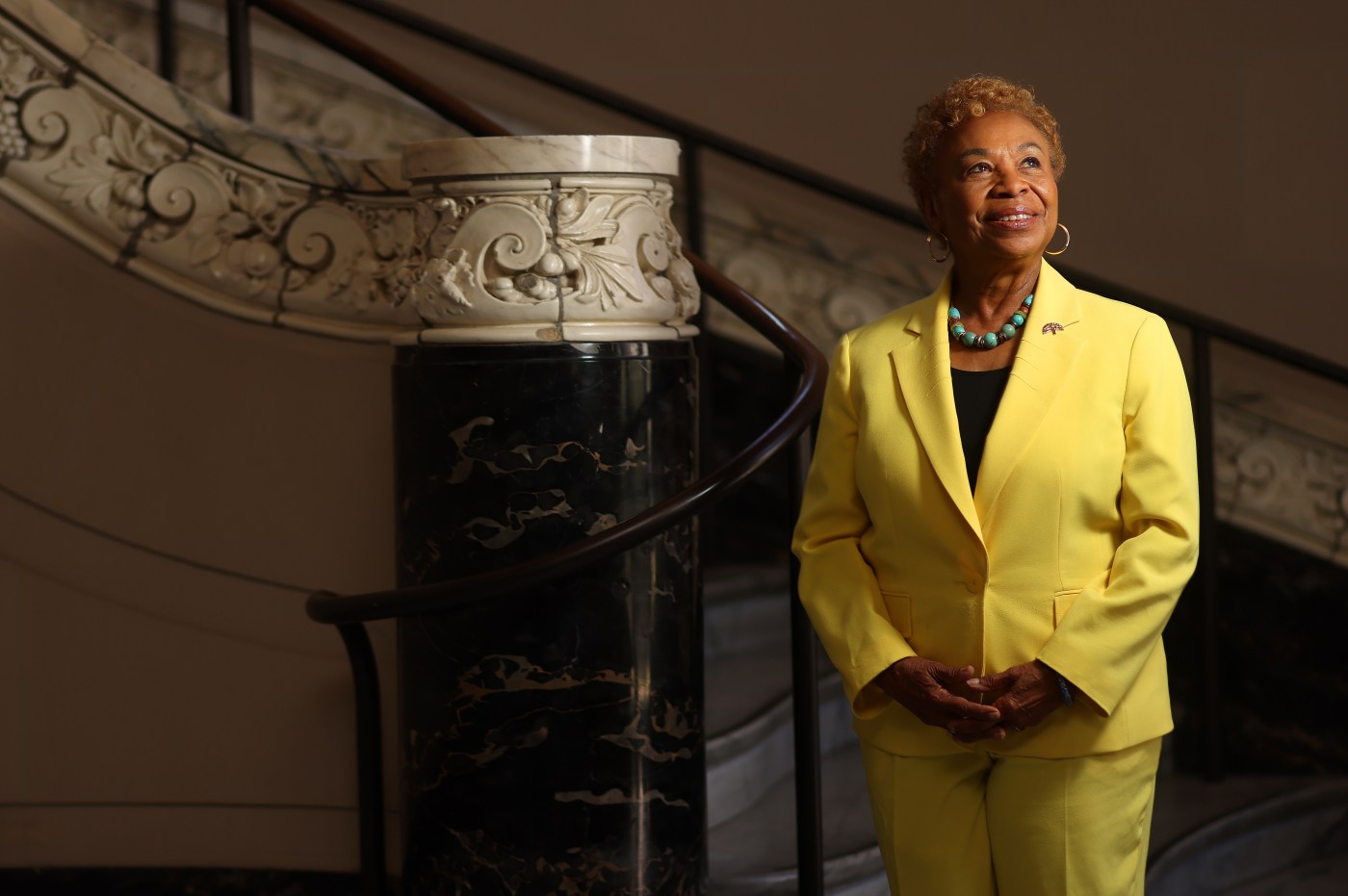OAKLAND — Mayor Barbara Lee promised to bring stability to a city in desperate need of it, and as she approaches 100 days in office this month she’s keeping her office steady— no messy political fights, no scandals, minimal conflict.
Related Articles
Miley: Jerry Brown’s changes in 1998 led to Oakland’s broken government today. Here’s how to fix it.
Lobbying, tension abound as Oakland ditches company tied to presumed FBI informant
Letters: Barbara Lee’s more of the same won’t solve Oakland’s homeless problem
Bay Area cities are toughening up on homelessness. Under Mayor Barbara Lee, will Oakland follow suit?
Murder convictions imperiled as scrutiny of embattled Oakland police homicide detective grows
Despite her relatively lower public profile, Lee has stayed busy — primarily in her mission to reform Oakland’s wonky system of government, which critics have called “broken.”
The city, meanwhile, is enjoying a relatively peaceful summer, with a steady drop-off in violent crime. And a federal judge, at a recent court hearing, credited Lee’s leadership as he expressed optimism about eventually relinquishing the Oakland Police Department from decades of mandatory oversight.
The mayor, in a shortened term that lasts until next November, also has added new leaders at City Hall, which has long been plagued by tangled bureaucracy and toxic politics.
“Over the weeks, we’ve continued rebuilding trust between Oakland residents and City Hall through direct action and real results,” Lee said in an email.
Here’s how the past three months have gone for Oakland under Lee, the 79-year-old former congresswoman who has filled the city’s top office after voters last year booted ex-Mayor Sheng Thao in a recall.
Lee looks to lead a reform of Oakland’s power structures
Oakland’s political circles have been buzzing for months with the general consensus that the city has a broken system of governance.
The mayor does not sit on the City Council, which has final say in all policy decisions. But those legislative goals are executed each day by the city administrator, who is hired and fired by the mayor.
Oakland Mayor Barbara Lee speaks as Major League Cricket CEO Johnny Grace, left, and former Oakland councilmember Rebecca Kaplan look on during a press conference a day before the inaugural Major League Cricket season at the Oakland Coliseum in Oakland, Calif., on Wednesday, June 11, 2025. The opening game between the San Francisco Unicorns and the Washington Freedom is scheduled for Thursday at 6:00 p.m. (Ray Chavez/Bay Area News Group)
It has worked this way ever since former Mayor Jerry Brown persuaded voters in 1998 to amend the city charter.
If it sounds convoluted, Lee agrees. Following through on a campaign promise, she has assembled a working group to discuss changing the charter again. It could mark a significant shift in the city’s seats of power, which, at the moment, are often at odds.
“I was told by deep insiders that there was no appetite for charter reform in Oakland,” said Steve Falk, a former city administrator who has led the push to do just that. Falk is not a member of the working group, but he described feeling “excited and thrilled that the matter is being discussed.”
Ultimately, voters may be asked to return the mayor to the council, strengthen the top office’s policy-making authority or grant the mayor some kind of veto power — maybe a combination of two out of three.
“There’s no magic unicorn of a model,” said Corey Cook, a member of the seven-person working group and a high-ranking official at Cal Poly Solano who has extensively studied city governments. Of the country’s 50 largest cities, he said, none are structured like Oakland.
Oakland’s Ceasefire program credited with reducing crime
There are few evident links between a brand-new mayor and a local drop or rise in crime, especially given Oakland’s odd mayor-government power structure.
But a drop in violence may be contributing to more positive vibes around town. Oakland police have investigated 41 crimes as homicides this year through Aug. 3 — a 24% decrease from this time last year, according to data provided by the city police.
There were 54 crimes investigated as homicides last year by Aug. 3, and 65 such crimes over the same time period in 2023. Other trends echo the steady decline: Reported burglaries are down by 25%, robberies by 41% and violent crime as a whole by 29%, according to the data.
Chief of Police Floyd Mitchell speaks during a press conference on Monday, Dec. 30, 2024, in Oakland, Calif. City leaders and community members took part in the event to call for the continued support of Oakland’s Ceasefire program to reduce gun violence. (Aric Crabb/Bay Area News Group)
City leaders, including the mayor’s predecessor, have championed Oakland’s Ceasefire strategy as a driver of reduced violence.
The new mayor led a series of teach-ins last month for the program, which is designed to intercept an endless cycle of retaliatory violence between local gangs through offers of jobs and social benefits, in exchange for no arrests.
She has also hired the Rev. Damita Davis-Howard, a key Ceasefire leader, as the city’s director of public safety.
A noticeably colder summer in the Bay Area, meanwhile, may be another possible factor behind the drop in the city’s levels of violence.
“We’re hoping the cooler air continues,” said Sgt. Huy Nguyen, the head of Oakland’s police officers union, which relentlessly criticized and attacked Thao during her tenure but so far has held off taking a similar tone with Lee.
Can the new mayor finally end oversight of Oakland police?
There may be no greater political accomplishment in this city than being the mayor who wrenched the Oakland Police Department from federal oversight, two decades after the Riders brutality scandal first placed the OPD there.
The department’s affairs are monitored by a court-appointed federal official. OPD has hit every conceivable setback in recent years, and again fell short in the monitor’s most recent report after failing to investigate a single complaint of officer misconduct in a timely manner.
At the hearing, however, U.S. District Court Judge William Orrick, who holds the power to end oversight, began the proceedings by offering lavish praise to the new mayor.
“I’ve admired your leadership for the last 25 years,” Orrick told Lee. “I hope that your leadership will bring court oversight to an end.”
Orrrick listened intently as Lee said she was hiring Michelle Phillips, the city’s former inspector general, as an assistant city administrator. Phillips will serve as a direct liaison between OPD and the mayor’s office with the express goal of figuring out how to end oversight.
“Let me tell you,” Lee told the judge, “a large percentage of my work has been on supporting compliance. This is truly a priority for me.”





